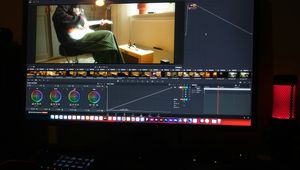
Hunting for the Right Track: How Adland’s Finest Consistently Elevate Their Music Game

When it comes to launching a TV ad that lingers in the minds of viewers, there’s a few different pathways to success. Often, the hero is the creative, with memorable writing or art direction buoying the work to acclaim. Other times, the quality of the deal or promotion being presented proves the ticket to reinforcing brand affinity. However, one common theme unites all good spots launched in this format – the soundtrack has to be killer.
Think about it for a second. Would this recently-launched New York Times ad effectively capture the power of a minute without the score enhancing the visuals and narrative? Or what about this spot for McDonald’s Canada? Sure, using something by Shania Twain may have been an obvious approach, but the team behind it still had to decide which one, which is easier said than done.
In other words, hunting for the right sound can be a real ordeal. Seldom the hero of the spot, yet always tasked with elevating the creative to new heights, music supervisors, composers, and producers face a high-stakes ask every time they’re handed a new brief… and yet, more often than not, they stick the landing. It’s just about knowing the right procedures, says VML’s executive music producer, Paul Greco.
“Landing on the right music track for a spot can take any number of paths,” he explains, breaking down his initial process. “Library music, indie music, famous music, and custom-created music can all be options based on the creative idea, the schedule and especially the budget. So, when trying to execute a music brief, the first thing to try to analyse is the role music will play in the work. Is music in more of a ‘supporting role’ to just set the mood and pacing of the visuals, or it is a ‘featured player’? From there we decide how we execute and what resources we need to draw upon.”
This is a sentiment which Josh Gibbard, music producer and supervisor at SIREN, echoes. Likening the job to the hunters of old, “chasing down mammoths and bison across plains of wilderness”, he states that no venture can be successful without an understanding of per project approach, and then adapting based on that.
“Everything changes from hunt to hunt,” he says, maintaining his analogy. “Perhaps your leader has a clear idea of which beast is to be slain, and you’re purely the muscle, sent out there with whatever spears and arrows the budget allows for. Or, perhaps, you are called upon to advise what meat pairs well with the berries and nuts to hand. Yes, while a saddle of rabbit may not carry the same gravitas as serving up a whole black bear (like AC/DC), one cannot deny that it pairs better with the groundwater in our cups on an evening like tonight.”
So, just how does one procure an appropriate ‘cut of meat’? That depends on the essential question all supervisors must ask: does the project require a search, or original composition?
Treasure Hunting
When committing to the quest for a perfect accompanying track, according to The Futz Butler senior composer and producer Keith Bayley, it cannot be described in any fashion other than a high-risk, high-reward endeavour. While the potential for awards is apparent, with the composer citing several works that stand the test of time, scored to the likes of Dvorak’s ‘New World Symphony’, ‘Phat Planet’, ‘Stuck in The Middle With You’, ‘In The Air Tonight’, and ‘Lust for Life’, he adds that the road there is fraught with pitfalls.
“Those [aforementioned] syncs are all so memorable that the films don’t need namechecking,” he continues. “But if it was that easy, everyone would be winning at it. What happens when you spend a small fortune to licence a track, but the artist’s fame cannibalises the brand message? Or worse, the artist gets up to mischief in a way that is very at odds with brand identity?”
These are certainly what-ifs that music companies dread thinking about. Aside from the strain it puts on everyone should the only possible solution be to call in a composer overnight – something Keith himself is not unfamiliar with – the financial ramifications of such an outcome are equally scary.
To this end, if the decision is made early on to commit to a music search, rather than create something bespoke from the get-go, there’s a few things to keep in mind.
First, suggests Josh, is the value of leaning on one’s team. Acknowledging that it’s possible for “a supervisor to single-handedly sling a rock and hit a sabretooth right between the eyes”, he points to the obvious – while a successful solo venture may be flashy, much safer and more reliable is the classic adage, ‘many hands make light work’.
Jumping in, Paul asserts that equally essential is cultivating great relationships with both major and indie labels and publishers alike. After all, many people seeking the right sound is useful, but actually having access – and a sense of confidence in the reliability of a given song selection – should not be undervalued.
Last but not least, the executive music director encourages aspiring supervisors to be cognisant of the existence of artists and songwriters who are ‘writing for sync’. “This means they are creating songs and instrumental tracks that are ‘ad friendly’ for licensing,” he explains. “These tracks can sometimes feel like they were bespoke compositions, but from ‘non-commercial’ music composers with a smaller price tag than major or indie label artists.”
However, regardless of whether a selected track is a mega-hit, or written for sync, both offer one additional advantage that composition can’t match: timing. Specifically, while custom music can better address creative direction and, in exceptional cases, become directly associated with a given brand, it also takes longer due to demos, revisions and approvals – something that poses its own set of difficulties.
“The biggest challenge is when an edit is in rough cut stage, and a ‘temp track’ is being used as the cut is being formed,” Paul finishes. “Many times, it is difficult to disassociate that track from the film, as it now is working hand in hand with the cut. In fact, sometimes substituting it leaves a void, so it becomes about either trying to license that track (if it is available and affordable), or creating a custom track that captures the same spirit. Many times, we can top it, but there are times when we don’t.”
A Case for Composition
Despite the award-potential and executional advantages of soundtrack searching, there’s still a lot to be said for the merits of composition. Case in point, McCann Birmingham’s executive creative director, Adam Bodfish, is a staunch and outspoken advocate for original work.
“Hunting for the right track is like chasing a pigeon in a shopping centre – chaotic, exhausting, and never quite going where you want it to,” he says. “This is why it’s not always about finding the perfect track; it’s about making it. And occasionally, you make it so unapologetically loud, fast and joyfully absurd that it stops feeling like advertising, and starts feeling like entertainment.”
The ECD’s own body of work reinforces this point, with a standout being a campaign he helped create for Crumpton Oaks Cider. Here, from the start, the team skipped the library scouring, sync rights pleading and reimagining of “dead-end reference tracks”, and instead worked with DJ Hixxy and MC Whizzkid to create an original “banger”, right off the rip.
“In this instance, casting wasn’t about the name – it was about getting the right name for the job,” Adam recalls. “If you’re building a shed, you call a carpenter. If you’re building a ‘Happy Applecore’ anthem about cider, you call the two blokes who’ve been headlining raves since before most TikTokers were born. Because of this, the result wasn’t an ‘ad with music’. It was a piece of music that happened to have an ad attached… and that’s the point. We should be making art, or entertainment – things people choose to watch, not 30-second interruptions they scramble to skip.”
This sentiment is equally near and dear to Keith’s heart. Offering up a “bespoke composer’s point of view”, he encourages his colleagues to position music as a true sibling to visuals: something with the potential to be spun up spontaneously.
“[With an ad], visuals are new, original, unimagined – the creative process unshackled,” he explains. “But, even across my earlier examples, all the tracks already had their own lives, with associated imagery and memories. By definition, the interest was borrowed. The balance then became the trade-off between familiarity and cannibalisation.”
As such, the composer believes it’s important to create that which is “entirely original, innovative and unimagined” when possible, both because it helps break default working patterns, but also because it ensures the music is crafted from the same “unshackled process” as the imagery, matching its bespoke originality.
“Potential bumps in that road exist, but they can be avoided,” he advises. “Don’t think about how you want the music to sound, or who it should sound like. Our unique briefing process focuses directly on this: what do we want the audience to feel? Then, define that feeling. Let the composers and sound designers do their work.”
Building on Keith’s point, Adam concludes by encouraging music companies to let their composers loose, emphasising that just because a song isn’t mainstream doesn’t mean it’s not capable of making people dance along with it.
“Next time you’re hunting for the right track, maybe don’t hunt at all. Make it. Make it with people who live and breathe the genre. Make it so it can stand alone in a playlist. Make it so good it doesn’t just sell – it sings.”















